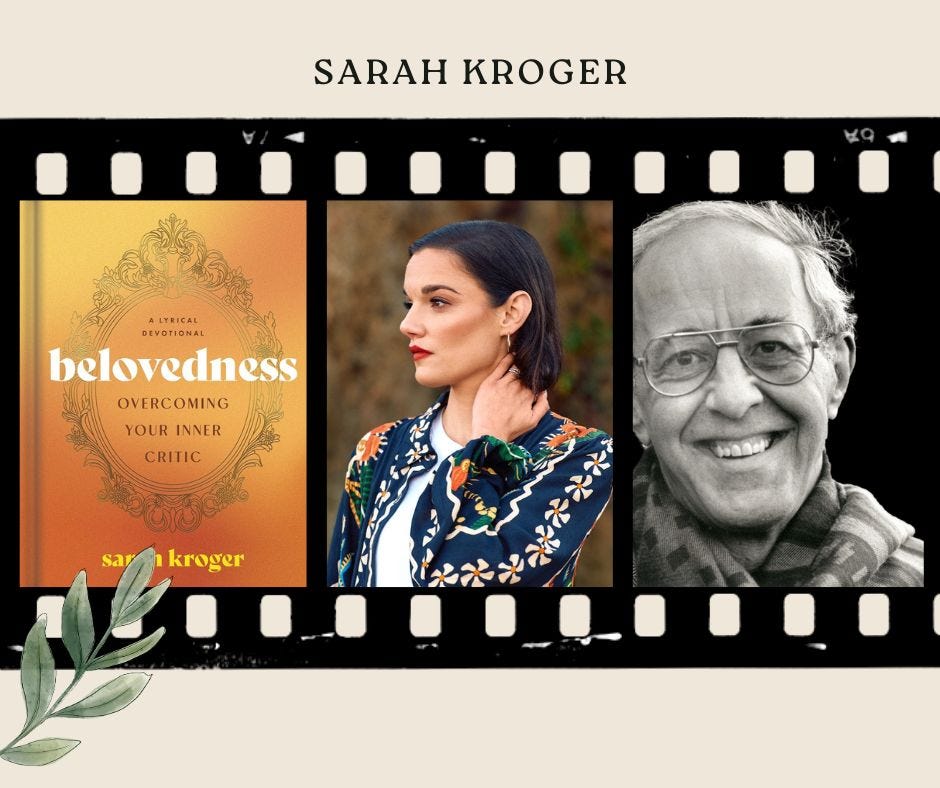Last week, my friend Sarah Kroger’s new devotional was released into the world. Belovedness: Overcoming Your Inner Critic is a beautiful devotional that encourages women to seek self-compassion, embrace your gifts, and run straight into the arms of an always-waiting God.
As a writer myself, I’m always fascinated to see and understand the progression of how art is made. We’re all so influenced by one another—walking through the world and grabbing scraps of this-or-that to paste together in a collage of our own making. It’s so interesting that Sarah can explain the exact genesis of her devotional: it’s based off of her popular song “Belovedness”, which was inspired by Henri Nouwen’s Life of the Beloved.
I wanted to invite Sarah to Letters for a few reasons. I think she’s a gift other to the church; I think she’s a beautiful example of a Christian artist who cares deeply about craft; I think she has interesting things to say and her book will help tons of women. If you’ve ever seen Sarah perform, you know this is true: she is a person who is not on stage to be adored, but to adore Christ and lead us in that.
But also, because this message is one I’m praying with in a particular way this season of life. How do we truly start to see ourselves as God does? How do we practice gentleness and care with ourselves while also fully acknowledging our brokenness?
Here’s my (condensed) conversation with Sarah.
Claire: You are a widely acclaimed singer. Many people would look at you and think…has made it. Is living the dream. So they might be surprised to hear that you wrote a book on how hard it is to love yourself. Can you speak into that? What inspired you to write the book?
Sarah: It’s funny you say that because in a lot of ways, that was the inspiration. So, the book is really based on a song. A few years ago I think a lot of people would have thought what you thought: I was making new music, I really seemed to have it together, I was performing…I just looked like I was thriving, but I wasn’t. A friend handed me a book called Life of the Beloved by Henri Nouwen and it just really spoke to my heart. It took me on this journey of owning my own belovedness, and of realizing how I’d really been living in fear instead of freedom. I was constantly comparing myself and critiquing myself and I just felt like a fraud.
With that book, I started to really embrace what is most true about me, which is my belovedness. And that identity is my core identity. Like, yes, I’m all of these other things—I’m a singer, I’m a wife, I’m a sister, but I have a more important identity. I’ve done all of this work in prayer, and in therapy, and with God, to get to a place where I can own that truth. And the song really resonated with people. So I wrote “Belovedness”, and that song really resonated with people. The book is a lyrical devotion based on the song, and based on helping other people really remain rooted in that core identity of belovedness.
Claire: You mentioned therapy, and you also talk about both therapy and medication in your devotional. Something I’ve been noticing is that lately—I mean, there’s always been a therapy stigma. But I think as the modern world becomes more and more enthralled with therapy, there’s like a weird backlash from Christian circles about therapy. Like, people are afraid of their kids going to therapy, or they think we’re just over-diagnosing everybody, or that we’re talking about emotions too much. Do you have any thoughts on that?
Sarah: Everything these days is just one extreme or the other. And that’s so sad to me. I’ve been in therapy since I was ten years old, when my parents got divorced. They were like, “you need to talk to somebody about this”. So for me, there was never a stigma. I was raised to believe therapy was important. It’s been immensely helpful in my life. I think it’s that neutral third-party, and having someone just point out: “hey, do you realize you’re saying this? Do you realize you’re in this pattern? Have you noticed this?” Someone who can help remind you that emotions aren’t bad, they can be useful signs and help us understand what’s going on around us. So, yeah, I think that’s really unfortunate. Therapy can be really, really helpful for people.
Claire: It’s interesting when you’re a public person, though, because you don’t just have an inner critic. You have an outer critic. Literal critics. I mean, even for myself, I’m dealing with internal shame and then I’m also dealing with literal emails from people who are telling me how bad I am. And I’m assuming you’ve had people not enjoy your music before, and let you know that. Which is harder for you?
Sarah: That’s a hard question! I mean, when someone doesn’t like my songs, it is hard. It almost feels like someone’s insulting your child. But I think the inner critic can just be even louder because it gets to that deeper root of who you even are. And so that one is harder to deal with. They’re both difficult, though. It’s so hard to not compare how you’re doing to other artists. People don’t have to enjoy my music but that doesn’t take anything away from my belovedness and it doesn’t change how God sees me.
Claire: Lately I’ve been praying about the idea of self-compassion. Something that comes up in spiritual direction for me a lot is how I just constantly feel like the older brother in the prodigal son. I’m outside angry that all of these horrible sinners are getting instant forgiveness. But it’s been pointed out to me that a lot of that judgement comes from judgement against myself. Like, I hate my own sinfulness so much that it’s spilling out as angry judgement on other people. So I’m really trying to work on that, but it’s hard. How do you practice self-compassion on the days where you’re just not feeling it?
Sarah: There are definitely days where I’m feeling good, I’m reminded of my identity, I’m recording, I’m doing well…and then there are days where you just hear and believe lies from the devil. He wants us to feel alone, and he wants us to forget who we are. And I think on those days, it’s about returning to things I know are true. And, like I said, therapy has been really helpful to just work to learn to love myself and see myself the same way God does. We might be looking in the mirror and just seeing all the mistakes we’ve made and all the ways we aren’t as good as someone else, but when God sees us, he sees what he made. He sees our goodness.
Henri Nouwen: “That’s the truth spoken by the voice that says, ‘You are my beloved’. Listening to that voice with great inner attentiveness, I hear at my center words that say, ‘I have called you by name, from the very beginning. You are mine and I am yours. You are my Beloved, on you my favor rests.’”
Claire: You obviously have great affection for Henri Nouwen. What other saints have been helpful for you on this journey of owning your belovedness?
Sarah: I’ve always had such a love for Mother Teresa. Just the way she served people, but also, the fact that she had this interior darkness for so long. And nobody knew! Nobody knew how badly she was suffering, but she kept loving God, she kept clinging to him and coming back to him. Because she knew what was true. She knew that her identity was bigger than what she was feeling in the moment. And she did the work that God gave her to do.
Sarah Kroger is a GMA Dove Award-nominated artist, songwriter, and worship leader. She’s currently on tour, and her new devotional Belovedness: Overcoming Your Inner Critic is available now wherever books are sold. Remember: the best place to buy books is your own indie bookstore. ;)
On My Nightstand
Voyage of the Dawn Treader by CS Lewis: My littles and I are making our way through the Narnia audiobooks and having so much fun doing so. If you’re a Narnia fan, please let me know in the comments which book in the series is your favorite!
Learning to Rehuman: On Pope Leo 14: Beautiful piece from
, who rarely misses. “The opinions were formed by what? I suppose they were formed by what some call ‘research,’ which is a fancy way of saying I hopped on Google or ChatGPT, asked a few questions, and formed an opinion within minutes. Such is the way of the talking heads; such is the way of people. Humans—all of us—turned and turned through the fingers of God.”More Young Women Will Pursue Family Life If Good Men Step Up: The Institute for Family Studies is consistently putting out fantastic content and this thoughtful piece was no exception. “If a new and growing women’s movement can inspire young women to stop giving away their bodies to unworthy men, then men have got to become worthy of receiving them again. As mothers, women must do their part with their sons, teaching them how to govern their appetites and avoid the poison of porn. But as a cultural matter, it’s good men who must step up—to inspire young men to put down the porn and aspire to become gentlemen.”
Reclaim Imperfect Faces: This article made me want to stand up and cheer. Our views of what people are allowed to look like anymore have completely shifted, and I firmly believe this is an area where feminists from all places on the political spectrum could find a lot of common ground.
In case you missed these Letters:
Could you do me a quick favor?
Almost 100% of our growth here comes from recommendations. If you’ve made it this far, I’m guessing you have a passion for feminist discipleship. If you could help us spread the word about Catholic feminism, it would mean the world to me. Taking five seconds to share this letter on your social media of choice, or even just forwarding it to a friend, makes such a big difference. Thank you so, so much for sharing Letters From a Catholic Feminist!











Narnia books? The Silver Chair, hands down. The last few chapters of Dawn Treader are amazing, though.
If you haven't read Till We Have Faces, also by Lewis, it's quite an exploration of Providence, love, and jealousy. Not a good children's read-aloud, but definitely worth a read.
I don’t know if I can pick a favorite Narnia book! I just love every single time Aslan shows up 😭